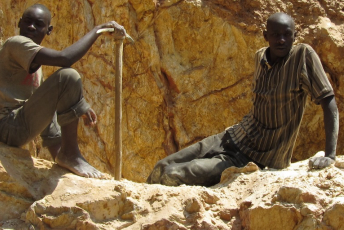Illo is nestled in the vast semi-arid savanna of Dabel in Marsabit County along the Kenya-Ethiopia border. This makeshift shanty mining town sprang up in six short months since January 2023 and now accommodates over 20 000 people, both Kenyans and those from neighbouring countries.
Most of the gold mined here is sold illegally in Kenya – with substantial amounts smuggled into Ethiopia by middlemen for onward transfer to the Middle East, say local sources.
Legal artisanal and small-scale mining (ASM) contributed $224 million to the Kenyan economy in 2022, representing over half of the country’s mining output. This sector creates jobs, employing roughly 250 000 miners, 40% of whom are women, and supporting the livelihoods of over 800 000 people.
However, when unregulated, as in Illo, it is quickly associated with crime, sexual violence, trafficking, conflict over resources and land, health and environmental hazards, as well as corruption.
Kenya’s current Mining Act (2016) recognises the importance of ASM to the mining sector and the national economy’s growth. The government also recognises challenges and, in November 2019, it issued a moratorium on new mining and exploration licences. This froze the issuance of new licences, including for ASM, as it sought to clean up the industry and map out the country’s mineral resources.
Not only has Kenya lost billions of shillings in revenue because of the moratorium, but several unlicensed and unregulated mining activities that have sprung up in mining sites like Illo are also consequently illegal.
After much lobbying from mining stakeholders over the past four years, the moratorium was lifted on 3 October 2023. The government has instituted a series of progressive reforms to streamline the sector, shutting down 3 000 illegal entities, conducting a countrywide mineral geo-survey, establishing a formula for sharing earnings and declaring mineral smuggling an economic crime.
While it is too soon to say how these reforms will disrupt informal and unregulated ASM, the harms, for now, continue. Miners are exposed to hazardous chemicals, vulnerable to extortion by cartels and criminals, poor pricing, labour trafficking and unhygienic working conditions, while environmental degradation is unchecked. The challenges faced in Dabel reflect similar problems at ASM mining sites in other parts of Kenya, like Migori, Kakamega, Transmara, Nandi and West Pokot.
Barely 50 km from the Kenya-Ethiopia border, the Illo mines have attracted hundreds of illegal migrant miners with no mining permits from broader East Africa, including Ethiopians, Sudanese, Ugandans, Tanzanians and Somalis. While some are organised in groups, most engage in individual extractive activities.
Haro Jillo, an Ethiopian miner, says middlemen rent out hand-held gold detectors and small digging machinery to the migrant miners. Jillo says 1 g of gold can be sold for KES7 000 (US$45). ‘It’s a game of chance,’ he says. ‘Many dig for months and get a few grams only to use the money obtained from the gold to pay the huge debts they owe to traders, leaving them to go back home empty-handed. Others strike much gold within a few days.’
Tensions have been simmering for months between locals and foreign miners over illegal resource extraction. Some locals feel they do not have the capacity to compete with migrant miners due to a lack of resources and tools for extracting the gold, and fear that Kenya’s mineral wealth is being looted and their lands taken over.
While some miners, both locals and migrants, rely on the police authority and use of force to protect their extracted gold, many reportedly also use illicit arms for protection. Although such reports were denied by miners who spoke to ENACT.
Poor sanitation is also a problem in the sprawling mining town. It is believed to have triggered a cholera outbreak in May 2023, leading to 15 deaths, say unofficial sources. Sexual assault, substance abuse, drug trafficking and other problems are also rife.
Some community members have called for the closure of the mines, a call initially heeded by the government but later reversed. Other attempts to address the looming health and security crises at the mines by the relevant government agencies have proven futile in the face of competing interests of locals, miners, surrounding communities and the national government.
Edin Adi, a local member of the county assembly, is in favour of mines remaining open. He blames the media for hyping the health and security concerns at the mines. He says the mines promise a glimmer of hope for thousands of locals and their Ethiopian neighbours who have been rendered destitute due to the collapse of their livelihoods because of drought and famine.
Ismail Ahmed, an Ethiopian miner, told ENACT that the community elders had instituted strict customary laws to address security breaches and disputes between miners. They also enforced backfilling of dug-out mines every Sunday to mitigate environmental degradation. This aligns with Article 179 of the Mining Act calls for the sustainable use of land by restoring abandoned mines and quarries to their original state or to an acceptable and reasonable level, as close as possible to its original state. Here the National Environmental Management Authority is well-placed to further support and coordinate these community-initiated responsible mining practices.
Since lifting the moratorium, the government has also announced the finalisation of a countrywide mineral geo-survey and established a formula for sharing earnings. In a clear move to curb organised criminality within the sector, it also declared mineral smuggling an economic crime.
Along with operationalising these reforms at mine-level, a government focus on fast-tracking the issuance of new licences to artisanal miners is needed to further curb revenue loss. Addressing the impacts on sanitation risks, promoting responsible mining and ensuring community-friendly royalty distribution formulas are encouraging responses to address issues rapidly unfolding in Dabel.
So too the establishment of devolved and national mining departments at sub-county levels, such as the county artisanal mining committees, is a positive development to ensure better regulation, safety and security, and supervision of unregulated artisanal sites, offering additional safeguards to protect small-scale miners from exploitation by middlemen and poor gold pricing.
Halkano Wario, ROCO, East Africa, ENACT Project, Nairobi
Image: © Sipa USA/Alamy Stock Photo








